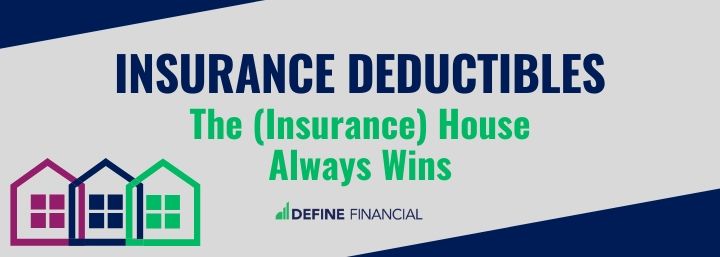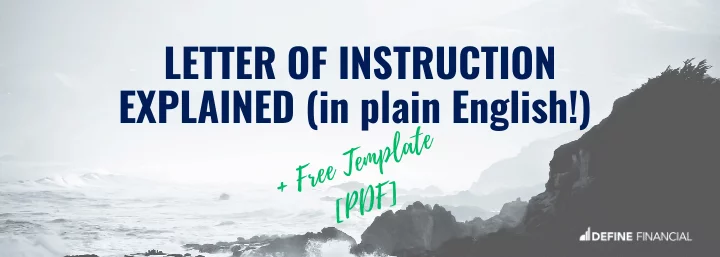
Today, I’m going to show you how to save money by not having an insurance policy.
This is the opposite approach from what we’ve been taught for many generations.
Insurance is supposed to protect our investments and save us money when harm comes our way, right?
Not always.
If you want to truly protect your financial investments and save money at the same time, you’ll enjoy today’s post.
How Does an Insurance Deductible Work?
Recently, I was having a conversation with my investor partner, Kevin, about insurance options for the rental property we own.
The topic of the debate was how much our insurance policy’s deductible should be.
“Should we go with a deductible of $2,500 or $5,000?”
First, let’s review how an insurance deductible works.
An insurance policy’s deductible determines how much of a financial loss you must endure before an insurance company ponies up.
Kevin was arguing for a $2,500 deductible.
That means if our $60,000 rental property burned to the ground, the insurance company would reimburse us $57,500 if we choose a $2,500 deductible.
$60,000 – $2,500 = $57,500
Self-Insure: Choose the Highest Insurance Deductible You Can Afford
As usual, I was arguing for a higher-deductible for dwelling coverage. I would scrap dwelling coverage entirely if the insurance company would let me.
That’s because the houses we are buying aren’t very expensive. If we lost an entire property, we’d still be financially solvent.
And that’s the way you want to use insurance: only buy insurance when you can’t afford to manage a financial loss yourself.
The only reason I want property insurance at all is for liability coverage. Unfortunately, you can’t get liability coverage without buying dwelling coverage as well.
Why scrap dwelling coverage? Because the house always wins. (In this instance, the house is the insurance company.)
Said another way: if you can afford to take a financial loss without having the insurance company step in to save you, then save your money and don’t buy the insurance policy. On average, you’d be better off financially this way.
Running the Numbers on an Insurance Policy: Does it Pay Off?
To give this philosophy an example, let’s return to the discussion with my business partner.
Kevin and I were debating the size of the deductible on our rental property. Here are the numbers:
- We could choose between either a $2,500 or a $5,000 deductible.
Remember, the larger deductible means we are getting less insurance coverage. In this instance, we’d get $2,500 less insurance coverage with the $5,000 deductible.
- Moving from a $2,500 to a $5,000 deductible would result in $18 in annual savings on the insurance premium – the annual cost of the insurance.
- Said another way, we could pay an additional $18 for an additional $2,500 worth of protection.
Kevin was convinced that this was a helluva deal. He wanted to pony up the extra $18 in premiums (each year) for the extra $2,500 of coverage.
I couldn’t disagree more. I had a couple of reasons why.
First, I ran the numbers (which I’ll go over shortly.) My second beef is a philosophical one: the insurance company wouldn’t be in business if this wasn’t a good deal for the insurance company.
Insurance Companies Exist to Turn a Profit
Insurance companies have whole teams of actuaries crunching the numbers. They already know – ahead of time – how to price an insurance policy.
These insurance geniuses know how to set the terms of the insurance policy so that they will make a profit (on average).
But, it’s not just insurance companies who crunch numbers. It’s anyone who sells an insurance-like product.
This means extended warranty companies, companies selling structured notes, and the more sophisticated stock option purveyors.
What does this mean for you when you opt to purchase insurance or an insurance-like product?
- Think you’re going to win buying stock options?
- Are you going to come out ahead with the extended warranty on your car or your new TV?
- Is the cap on growth well worth the downside protection on your structured note or indexed annuity?
Think again! You couldn’t be more wrong.
Why am I so sure of this?
Because these companies selling these products wouldn’t be in business if the numbers weren’t in their favor.
A Company Must Be Profitable
It’s the same for any business!
How long do you think McDonald’s would be in business if it sold hamburgers for less than it cost to make them?
If you’re running a business without a profitable margin, you won’t be running that business for very long.
It’s the same for companies offering insurance-based products.
On average, a company selling an insurance product will take in more money than they pay out. If they didn’t, the insurance company would go out of business.
How Basic Math Can Help You Choose an Insurance Deductible
Still don’t believe me?
Enter an example to drive the point home. Let’s look at the specific numbers of this homeowner’s insurance policy Kevin and I were discussing to illustrate how the numbers play out.
Recall that we’d pay an extra $18 for an additional $2,500 of insurance coverage. And to my partner, that sounds like a good deal.
Now, I’ll show you why it isn’t.
If we pay the $18 – each and every year – for the extra insurance, there are two possibilities:
- We don’t make a claim on the policy.
- We make a claim on the policy.
First, consider the scenario that we never make an insurance claim. That means we’d never ask the insurance company to reimburse us for a financial loss.
In that scenario, we’d pay an additional $18/year for the life of the insurance policy – and get absolutely nothing.
Assuming I live to the ripe old age of 100, that means paying a total of $1,116 (not adjusted for inflation or growth). And you don’t need me to tell you that paying $1,116 for nothing is not a very good deal.
$1,116 in extra premiums + $0 in reimbursed insurance = $1,116 lost
But, what if we do file a claim? This will entitle us to an extra $2,500 in reimbursed losses.
Paying an extra $1,116 over the course of our lives to score $2,500 in realized insurance coverage means that we’d come $1,384 (nominal) ahead, right?
Wrong!
It’s wrong because guess what happens when you make an insurance claim? The insurance company raises your rates!
Insurance Companies Love to Raise Your Premiums
In one study, a fire claim (dwelling coverage) increases one’s insurance premiums by an average of 13%.
Applying this to our example, our $620 insurance policy would increase by 13% (~$80) had we made a claim.
That means paying an additional $6,076 over my lifetime to get an additional $2,500 in realized coverage.
That’s a net loss of $3,756. (Again, all these figures are nominal.)
$6,076 in extra premiums – $2,500 in reimbursed insurance = $3,756 lost
In summary, there are two scenarios:
- If we buy more insurance – but never use it – we lose.
- If we buy more insurance and do use it, we lose even more.
In either scenario, we lose.
This makes sense given the nature of the insurance business. Insurance companies are not in the business of losing money. If they were, they simply wouldn’t be in business.
If you have the financial resources, it sounds like the best option is to not buy insurance. This is called self-insurance.
How to Use Self Insurance to Help With Insurance Deductibles
Let’s stick with my example above. Since I have more than $2,500 in cash to fix any issues with our rental property, it makes sense to self-insure, at least for part of my policy.
This means not paying an additional $18/year for a lower deductible.
I do this because, on average, I will save money in the long run.
In short, if you can afford to bear a particular financial loss yourself – like your car breaking down – don’t buy insurance for it. This means skipping an extended warranty for your automobile.
Avoid Insurance-Like Financial Products
The same approach to homeowner’s insurance above needs to be applied to insurance-like financial products. This means:
- Put options
- Structured Products
- Indexed/Variable Annuities
Put options, structured notes, indexed/variable annuities, and similar products can perform a similar function: limiting stock market risk.
As with all insurance-like products, there’s a cost.
And just like the property insurance example above, that cost is likely not worth the protection – if you can afford to bear the risk yourself.
Running the Numbers on Put Options
Can buying a put option offer you downside protection against stock market drawdowns?
Of course, it can. But, that doesn’t mean it’s worth it.
Why?
The numbers aren’t there. You’ll pay more to get protection than you’ll actually realize.
But, my position on the issue isn’t solely based on the principle that the options seller wouldn’t exist were this not the case.
A PIMCO study showed that selling put options could be profitable. This was the case over multiple asset classes, including stocks around the world, as well as commodities.
A different study, examining options on U.S. large-cap stocks, can be summarized like this:
“[Buying put options] can be a longrun money loser.”
A third study supported the finding that selling put options was a profitable strategy, even amidst the stock market volatility of the Great Recession!
Finally, a fourth study found that buying put options cut one’s investment return in half! The authors, who examined stock markets around the world, concluded:
“Simply lowering equity exposure would have been a more efficient alternative.”
In short, if the stock market is too risky, the solution isn’t to buy an overpriced insurance product that will disproportionately eat away at your investment return.
Instead, the solution is to limit your risk by reducing the risk at its source.
You do this by limiting your stock market exposure. This is as simple as holding fewer stocks – and more Treasury bonds – in your investment portfolio.
Buy Insurance Where You Need It
If you skip insurance where you can afford to cover the cost yourself, it increases your ability to purchase insurance where you can’t afford to cover the expense.
For most people, this means purchasing:
- term life insurance (if someone else depends on your income)
- disability insurance (if you’re currently employed)
- homeowner’s insurance
- liability coverage (via auto insurance, home/renter’s, and an umbrella policy)
Larry Swedroe and Kevin Grogan say it well:
“Buying insurance is really about diversifying risks we find unacceptable to bear, because the costs of not being insured and having the risks show up are too great.”


